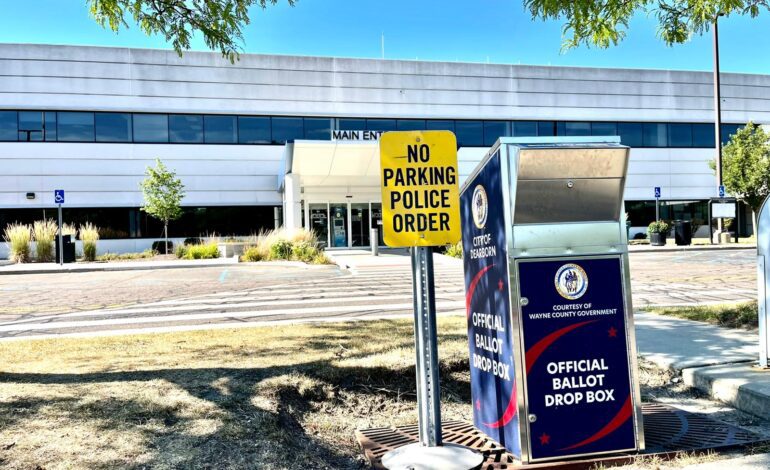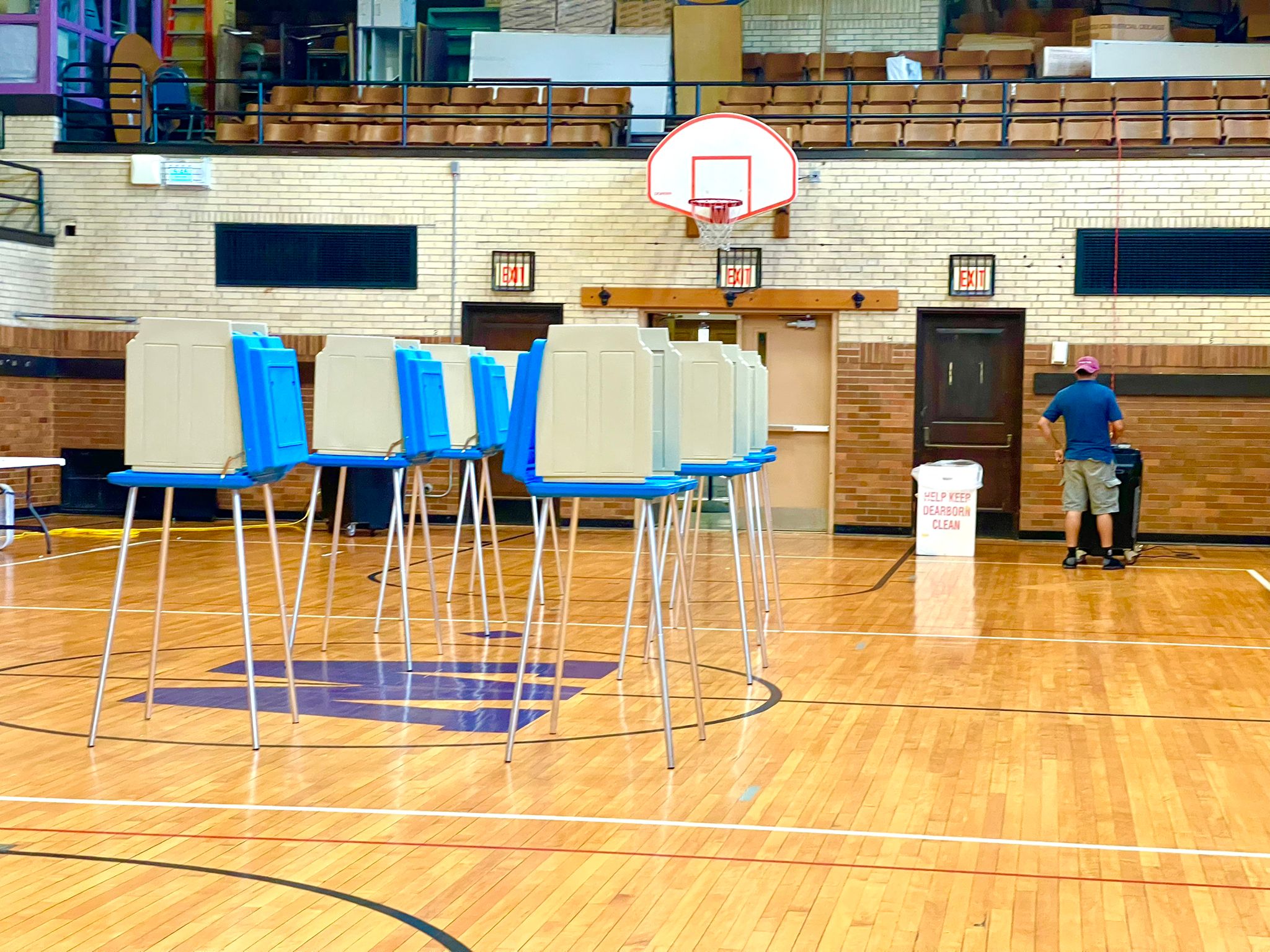DEARBORN – The Aug. 2 primary showcased some important races that cast a light on interesting developments in Metro Detroit politics, as well as national issues.
In the lead up to key congressional races, major events created new potential for representation in a changing political landscapes in Metro Detroit.
For the first time in the state’s modern history, an independent commission comprised of citizens with various party leanings redrew political boundaries for State House, Senate and Congressional seats, with public input.
The resulting maps, made into law on March 26, broke up and re-formed boundaries, creating opportunities for increased representation in the state’s legislature by people from Arab American neighborhoods in Dearborn, but also absorbed some historically Arab communities into new districts, somewhat dampening their voting power.
Michigan also lost a U.S. House seat after the 2020 Census showed a population decrease. Incumbents had to decide between staying put in their districts or moving to new neighboring ones to compete, with one long-time congresswoman from Metro Detroit deciding to retire.
Another headline-grabbing phenomenon was the deluge of outside money into campaigns to defeat popular candidates who did not appeal to right wing, pro-Israeli apartheid sentiments.
And finally, the influence of former President Trump was felt in the Republican primaries, as voters decided where candidates fell on the spectrum in relation to the bombastic ex-commander-in-chief and his wild theories about elections.
As with any local election these days, our communities continue to enthusiastically engage with government, whether at the ballot box or running their own campaigns. The election also marked the very first time voters in Hamtramck and Dearborn got to experience voting in an U.S. election in their native tongue.
Nevertheless, the results of the primaries in some of the state’s most Democratic-leaning and populous counties, Wayne and Oakland, solidify those candidates’ chances for the general election in November.
As with any local election these days, our communities continue to enthusiastically engage with government, whether at the ballot box or running their own campaigns. The election also marked the very first time voters in Hamtramck and Dearborn got to experience voting in an U.S. election in their native tongue.
Here are some notable races that we think relate to our community the most. Candidates endorsed by The Arab American News appear in bold:
State House
Abraham Aiyash won the Democratic primary in the newly-drawn State House District Nine in spades on Tuesday. The incumbent looked to retain his seat in Lansing, this time to represent not only his native Hamtramck, but also new communities in east Detroit, all the way to Detroit’s borders with Grosse Pointe.
The new district also includes areas of Detroit like just north of downtown that are seeing increased real estate and city investments. Aiyash ran on a campaign of recognition that other historically Black Detroit neighborhoods are yet to see such investments. His long time environmental justice advocacy was also part of the platform, as was funding for education and more.
The message clearly resonated with voters. Aiyash easily beat out four other competing Democratic candidates with almost 61 percent of the vote. Second in line was Darnell Gardner at almost 18 percent.
“Detroit and Hamtramck, thank you for continuing to believe in a politics of the possible,” Aiyash tweeted on Wednesday. “I’m humbled to have earned your support, again. Onward.”
Aiyash will face Republican challenger Michele Lundgren in November.
Redistricting created three new State House districts in the area encompassing Dearborn, Dearborn Heights, adjacent parts of Detroit and Downriver communities. There, three new candidates, Alabas Farhat, Bilal Hammoud and Gus Tarraf, competed for Democratic primaries in districts that created opportunities for local candidates.
Tarraf lost out to incumbent Karen Whitsett, who already represents a northern slice of Dearborn, and adjacent Detroit neighborhoods, in the newly drawn District Four. Tarraf received 18 percent of the vote to Whitsett’s 55 percent. Lori Lynn Turner came in second with 27 percent. The district contains all of northeastern Dearborn.
Whitsett will face Republican Tonya Renay Wells in November.
The newly-drawn District 15 encompasses most of Dearborn Heights and a large slice of western Dearborn. There, Hammoud lost the primary to Dearborn City Councilwoman and native Erin Byrnes, 62 to 35 percent, with Afaf Ahmad garnering about 3 percent of the vote.
Byrnes will face Republican Steven Mackie in the November general election.
Though some saw the new maps as diluting the Arab vote, others have called it a chance of diverse, but local, representation of the area in Lansing.
(Read details on Farhat’s victory in an article in this week’s issue)
In newly-drawn State House District 54, covering Bloomfield Hills, Auburn Hills and more, Stephanie Fakih lost to Shadia Martini by just four points (39 to 35 percent of the vote).
Republican primary candidate Rola Zarife only received 9 percent and lost to Alicia St. Germaine, who received 36 percent, in a primary with four candidates for the newly-drawn State House District 62.
State Senate
In the newly-drawn State Senate District Two, incumbent Sylvia Santana received 81 percent over sole competitor Maurice Sanders (19 percent). District Two contains Dearborn, Dearborn Heights, parts of Detroit and Allen Park.
County Executive
On the county level, Wayne County Executive Warren Evans won the Democratic primary to retain his seat by a landslide, receiving 85 percent of the vote over Mohammed Alam (14 percent). Evans, who has been county executive since 2014, will now face Republican Mark Price in November.
Evans has close ties with the Arab American community, with several Arab Americans having worked in appointed and staff positions in his office, like Chief of Staff Assad Turfe.
County Commissions
Wayne County Commissioner Sam Baydoun won the Democratic primary over Mohammad Mubarak for his District 13 seat 81 percent to 19 percent. He will now face Republican Ann Clark in November. Baydoun has been county commissioner since 2018, running unopposed in 2020.
Wayne County Commissioner David Knezek ran unopposed in the Democratic primary for his District 8 seat and will face William Collop in November.
Robert Mijac won the Macomb County Commissioner District Five Democratic primary on Tuesday, winning 75 percent of the vote over Pashko Ujkic (25 percent). He will now face Republican Don VanSyckel.
(Read details on Wayne County Sheriff Raphael Washington’s primary win in an article in this week’s issue)
U.S. House
Haley Stevens ousted Andy Levin from Congress in the Democratic primary race for the newly-drawn District 11. The district sits entirely within Oakland County and includes Democratic-leaning communities of Royal Oak, Birmingham, Bloomfield Hills, Pontiac and more.
Stevens received 60 percent of the vote over Levin’s 40. She will now face Republican Mark Ambrose in November.
Stevens moved to the newly-drawn district just weeks after draft maps from the redistricting commission were released. Levin was born in and lives within the new District, but the new map places parts of his old district in the Republican-leaning District 10.
The two incumbents battled in a highly-publicized race that saw campaign funds for Stevens from right-wing pro-Israeli apartheid sources to beat Levin. Levin has been critical of Israel’s record on human rights, but supports U.S. funding of the Iron Dome and has resisted efforts to condition U.S. military aid to the Israeli occupation in Palestine.
The race highlighted growing anxieties from supporters of Israel who see backing from the U.S. party establishments chip away in face of reports by international rights agencies on its brutal occupation in Palestine.
Stevens got a financial boost from a super PAC launched by the American Israel Public Affairs Committee, commonly called AIPAC. AIPAC spent more than $4 million to help Stevens far outspend Levin, especially in ad buys.
AIPAC also spent more than $4 million in support of Democrat Adam Hollier in the newly-drawn District 13, covering much of Detroit and southern Wayne County. State Senator Hollier and Focus: HOPE CEO Portia Roberson came in second and third behind self-funded Shri Thanedar, who received 28 percent of the vote. Hollier received 24 percent, with Roberson receiving 17 in a crowded field of Democratic candidates.
Thanedar, who is currently a state representative, spent more than $5 million on the election, and will now face Republican Martell Bivings in November.
In the newly-drawn District 10 Democratic primary, covering much of southern Macomb County and Rochester and Rochester Hills, Huwaida Arraf received 13 percent of the vote, coming in fourth. Winner Carl Marlinga will now face former U.S senatorial candidate John James in November.
(Read details on District 12 incumbent Rashida Tlaib’s Democratic primary win in an article in this week’s issue)
Governor
Finally, in the Governor’s race, Republican Tudor Dixon rose above a crowded and chaotic Republican primary field to win 41 percent of the vote. She will now face Democrat Gretchen Whitmer in November.
Dixon received a last-minute endorsement from still-influential former President Trump, as well as his former education secretary and West Michigan billionaire, Betsy DeVos.
Though she recently dodged Fox News questions about whether she believes the 2020 election was stolen from Trump, she has in the past made baseless claims of widespread election fraud in the state following the 2020 election.
Dixon also has the endorsement of anti-abortion groups in a state where abortion rights now hang in the balance. Dixon has displayed an extreme anti-abortion stance, including in cases involving rape or incest.
A ballot measure to enshrine abortion rights in the state’s constitution will likely appear in November. For now, after the U.S. Supreme Court overturned constitutional protections for abortion, Whitmer has kept abortions legal through a complicated back and forth with state courts.







Leave a Reply